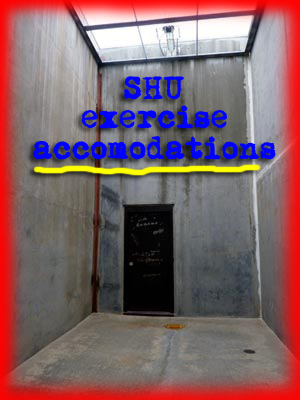LAWSUIT SAYS TIME IN SHUS SHOULD BE CONSIDERED TORTURE
The Center for Constitutional Rights filed a lawsuit against Gov. Brown, the head of the CDCR, Matthew Cate, and others on behalf of inmates who have been in isolation in Pelican Bay’s Secure Housing Units for between 10 to 28 years. The CCR claims that the solitary living conditions inside SHUs should be considered cruel and unusual punishment and thus, a violation of the 8th Amendment.
Here’s a clip from the Center for Constitutional Rights’ case description:
SHU prisoners spent 22 ½ to 24 hours every day in a cramped, concrete, windowless cell. They are denied telephone calls, contact visits, and vocational, recreational or educational programming. Food is often rotten and barely edible, and medical care is frequently withheld. More than 500 Pelican Bay SHU prisoners have been isolated under these devastating conditions for over 10 years, more than 200 of them for over 15 years; and 78 have been isolated in the SHU for more than 20 years. This suit asserts that prolonged confinement under these conditions has caused harmful and predictable psychological deterioration among SHU prisoners. Solitary confinement for as little as 15 days is now widely recognized to cause lasting psychological damage to human beings and is analyzed under international law as torture.
Truthout’s Tara Culp-Ressler reports on the issue. Here’s a clip:
The lawsuit is in line with United Nations experts’ recommendations for a nation-wide ban on solitary confinement. The UN Special Rapporteur on torture, Juan E. Méndez, urged the U.S. to cease the practice except in very rare cases:
Segregation, isolation, separation, cellular, lockdown, Supermax, the hole, Secure Housing Unit… whatever the name, solitary confinement should be banned by States as a punishment or extortion technique. […] Considering the severe mental pain or suffering solitary confinement may cause, it can amount to torture or cruel, inhuman or degrading treatment or punishment.
WitnessLA has also previously posted about Atul Gawande’s outstanding 2009 article published by The New Yorker in which Gawande explores whether or not solitary confinement is torture.
STUDY SAYS PLEA BARGAINS A PROBLEM FOR INNOCENT DEFENDANTS
A new study illuminates the considerable problems of innocent defendants’ plea bargaining out of fear of heavier sentencing.
Sentencing Law and Policy has the abstract. Here’s a clip:
Strikingly, the authors’ study found that over half of the participants were willing to falsely admit guilt in return for a perceived benefit. This finding not only brings finality to the long-standing debate regarding the possible extent of plea bargaining’s innocence problem, but also ignites a fundamental constitutional question regarding an institution the Supreme Court reluctantly approved of in 1970 in return for an assurance it would not be used to induce innocent defendants to falsely admit guilt.
(You can also download the study here.)
Note: This also relates to our previous post on Brian Banks’ exoneration after pleading no contest to a rape charge in order to avoid a 40-to-life sentence. You can revisit it here.
SLOW DEPENDENCY COURT SYSTEM A DETRIMENT
LA County’s dependency courts often drag foster care cases out for far too long, costing families time and heartache and costing children security and stability. LA Times columnist Jim Newton has been following one such case.
LA Times’ columnist Jim Newton has been following one such case. Here’s how his most recent article on the topic opens:
In the weeks since Juvenile Court Presiding Judge Michael Nash opened this county’s dependency proceedings to the press, there have been a number of revelations about a system that, until now, has been largely shielded from scrutiny. For the first time, the public is getting a broad look at the consequences of sloppy social work, the defensiveness of lawyers used to operating in secret, the agonizing decisions of judges, even the occasional happy outcome in which a family, once torn apart, is successfully reunited.
But one overarching fact of the dependency courts, where judges supervise the lives of children in foster care, is the high and hidden cost of delay. Some cases drag on for months, even years, while children lose their chance to begin their lives in secure, safe families.
Photo: Michael Montgomery/KQED
EDITOR’S NOTE: OUR HEARTS GO OUT TO THE LAPD OFFICER WHO FOUND HIS MOTHER SHOT TO DEATH SUNDAY NIGHT
Early Monday morning there were still few details and the name of the grieving officer had not been released.
The AP has the fragments of the story that are thus far available.
A Los Angeles police officer who went to check on his mother after she didn’t return his phone calls found her shot to death on Sunday.
The officer found his elderly mother inside her South Los Angeles home around noon, department spokesman Cleon Joseph said.
He said police had no suspect information and did not know the motive for the attack.
A family friend said the officer and his mother were very close.
“He checks up on his mother every day,” Allyson Smith said.
“She was beautiful, I mean a lovely mother,” Smith said. “That’s her only son.”
KABC-TV reported that the officer is a department veteran who trains recruits at the police academy…

